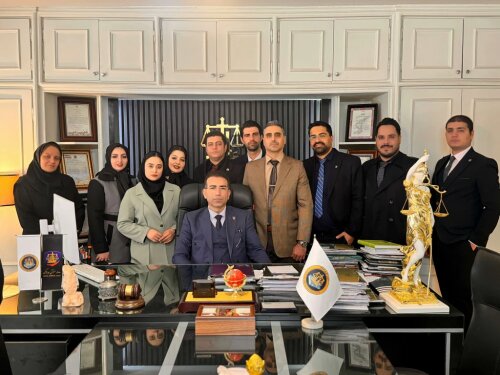Best Admiralty & Maritime Lawyers in Mashhad
Share your needs with us, get contacted by law firms.
Free. Takes 2 min.
List of the best lawyers in Mashhad, Iran
About Admiralty & Maritime Law in Mashhad, Iran
Mashhad, located in northeastern Iran, is not a coastal city itself, yet it is a significant economic hub with connections to the transport and logistics sectors, including those tied to Iran’s maritime trade routes. Admiralty and maritime law in Iran governs legal issues related to navigation, shipping, marine commerce, transportation of goods and people by sea, insurance, and offenses occurring on navigable waters. These laws often apply to individuals and businesses engaged in shipping or logistics within ports, customs, shipping agencies, cargo handlers, and insurance providers operating through Iranian transport corridors, especially for goods that move between Mashhad and Iran’s southern or northern seaports.
Why You May Need a Lawyer
Legal representation in admiralty and maritime matters can be critical for several reasons. You may require a lawyer if you encounter disputes over bills of lading, cargo damage or loss, injuries aboard ships, payments of freight charges, or breaches of charter parties. Legal help is also necessary when negotiating contracts for shipping goods or dealing with customs issues. In cases of maritime accidents, environmental claims, or arrest of vessels, an experienced legal advocate can help protect your rights and resolve complex cross-border regulatory and insurance issues. Additionally, if you are involved in international trade involving Mashhad’s industries transport and seaports, a maritime lawyer helps ensure compliance with both Iranian and international maritime regulations.
Local Laws Overview
Iran’s admiralty and maritime laws are derived from a mix of domestic legislation and international treaties to which the country is a party. The Shipping Code of Iran, the Iranian Commercial Code, the Maritime Law of Iran (enacted in 1964), and customs regulations are key legal instruments. Issues like ship registration, collisions, marine insurance, pollution liabilities, and carriage of goods by sea are subject to these laws. While Mashhad is inland, its businesses often rely on connecting their cargo through the country’s principal seaports (like Bandar Abbas or Chabahar), subjecting them to maritime jurisdiction. Courts in Mashhad can be involved in resolving disputes that are legal extensions of maritime transactions or transport contracts that originate or terminate in Mashhad, especially as part of the national logistics chain.
Frequently Asked Questions
What is admiralty and maritime law?
Admiralty and maritime law deals with legal issues related to shipping, navigation, commerce, and the transportation of goods and people across waterways. It covers matters such as ship registration, ownership, marine insurance, charter agreements, and accident liability.
Do Mashhad-based businesses and individuals need to know admiralty law?
Yes. Many businesses in Mashhad import or export goods using Iranian ports. Maritime law can impact contracts, cargo insurance, and the resolution of transit-related disputes, even for entities far from the coastline.
How are maritime disputes usually resolved in Iran?
Most maritime disputes are handled by specialized commercial courts that follow the Maritime Law of Iran, along with international conventions where applicable. In some cases, arbitration may be used for quicker resolutions.
What are common maritime legal issues faced in Mashhad?
Common issues include disputes over damaged or lost cargo, non-payment for shipping services, interpretation of shipping contracts, customs-related legal matters, and issues related to shipping insurance claims.
Are international laws recognized in Iranian maritime cases?
Yes, Iran has ratified several international conventions governing maritime activities, such as those related to marine pollution, safety at sea, and transport of goods. Iranian law incorporates these conventions to varying extents in relevant maritime cases.
Can a Mashhad court consider a claim about an incident at sea?
If the incident involves parties, goods, or contracts that are connected to Mashhad - for example, if the cargo was shipped to or from Mashhad - the local courts can have jurisdiction to handle related maritime claims.
What is the statute of limitations for maritime claims in Iran?
The statute of limitations varies depending on the nature of the claim, but most maritime claims (such as those involving cargo damage) should be brought within one year from the date of delivery or the scheduled date of delivery.
What should I do if my cargo is damaged in transit?
Immediately document the damage, notify the shipping company or freight forwarder, and contact your insurance provider. Consulting a maritime lawyer is advisable to ensure you meet notice requirements and preserve your legal rights.
Can vessels be arrested in an Iranian port for claims involving Mashhad businesses?
Yes. Iranian law allows for the arrest of vessels within Iran’s jurisdiction to secure maritime claims. This legal tool can help Mashhad-based businesses seek remedies if a shipping company fails to fulfill its obligations.
Do I need a specialized lawyer for admiralty and maritime matters?
Yes. Due to the complexity of local and international regulations, procedures, and the technical nature of maritime law, it is crucial to consult a lawyer who has expertise in admiralty law to ensure your interests are properly represented.
Additional Resources
If you need legal advice or assistance in admiralty and maritime matters in Mashhad, Iran, consider reaching out to the following resources:
- The Iranian Ports and Maritime Organization (PMO) - Regulates and oversees shipping and maritime activities, including licensing and compliance. - Mashhad Chamber of Commerce, Industries, Mines, and Agriculture - Provides resources and business support, especially for those involved in trade and logistics. - Local maritime law firms and legal practitioners with experience in Iranian shipping and transport law. - Iran's General Directorate for Transportation and Terminals - Handles road and transport issues that often connect with shipping.
You may also consult business associations, marine insurance companies, or logistics firms in Mashhad for recommendations on attorneys or arbitrators experienced in maritime law.
Next Steps
If you are facing an admiralty or maritime legal issue in Mashhad, Iran:
- Gather and organize all relevant documentation, such as contracts, correspondence, shipping records, and evidence of any damages or losses. - Contact a qualified lawyer who specializes in maritime law with knowledge of both Iranian legal processes and international maritime protocols. - Prepare to discuss the full details of your case, including any links to Mashhad or the specifics of your shipping or commercial arrangement. - Ask your lawyer about available legal remedies, the likely timeline, costs, and the best strategy for your situation. - If the issue involves an urgent matter (such as arresting a vessel or securing a claim), make sure to act promptly, as maritime matters often have strict deadlines.
Remember, early legal advice is key to protecting your interests in complex admiralty and maritime cases. Whether you are an individual, a business, or a logistics provider, the right legal support can make all the difference.
Lawzana helps you find the best lawyers and law firms in Mashhad through a curated and pre-screened list of qualified legal professionals. Our platform offers rankings and detailed profiles of attorneys and law firms, allowing you to compare based on practice areas, including Admiralty & Maritime, experience, and client feedback.
Each profile includes a description of the firm's areas of practice, client reviews, team members and partners, year of establishment, spoken languages, office locations, contact information, social media presence, and any published articles or resources. Most firms on our platform speak English and are experienced in both local and international legal matters.
Get a quote from top-rated law firms in Mashhad, Iran — quickly, securely, and without unnecessary hassle.
Disclaimer:
The information provided on this page is for general informational purposes only and does not constitute legal advice. While we strive to ensure the accuracy and relevance of the content, legal information may change over time, and interpretations of the law can vary. You should always consult with a qualified legal professional for advice specific to your situation.
We disclaim all liability for actions taken or not taken based on the content of this page. If you believe any information is incorrect or outdated, please contact us, and we will review and update it where appropriate.










